
Volunteer Post
An Exercise in Curriculum Development
F2F Volunteers, Frieda Park and Kate Robertson
We were fortunate to spend two weeks in Nepal working with Professor Binayak Rajbhandri and HICAST University, helping them to enhance their Masters in Agribusiness curriculum that will help develop entrepreneurship skills in their students. We were both drawn to the program due to our collective experiences in entrepreneurship, higher education, and agribusiness. Over the two weeks, we met with HICAST students, faculty, and staff as well as local business leaders to discover the gaps in the current curriculum and make recommendations on new courses and content that would help to develop a spirit of entrepreneurship within the institution and student body.

Through the assistance of Winrock staff, Chhan Bhattachan and Dr. Vrigu Duwadi, we were able to speak with several students within the program to hear their opinions and discover ways they thought the program could be more applicable to the real-world business environment and not solely on theory delivered via textbook and lecture. Since most students work full time and appreciate the idea of applied learning their feedback was helpful in understanding the gaps in the current curriculum.

We were also lucky to meet with members of Kathmandu’s agribusiness community to better understand the knowledge and skills students traditionally lack when entering the workforce. Business owners believe that graduates lack real-world experience and struggle to convert the theories they learn in school to the applications needed in the workplace. They want to see graduates come out with more real-world experience and applicable knowledge.

Lastly, we met with several members of the HICAST faculty to comprehend the courses they taught as well as the delivery method of the content. We learned that faculty in Nepal universities are not full time, rather they work in full-time jobs and often teach classes on the side. As a result, they rarely have time to make curriculum changes, spend time on paperwork or facilitate educational opportunities outside the classroom. These time constraints pose a considerable barrier to implementing a more robust curriculum dependent on experiential learning, which we deemed necessary to create a more entrepreneurial system.
We presented our findings to the HICAST leadership during a lively discussion. We acknowledged that some of our recommendations could be implemented immediately and that some would involve a much “bigger lift”, including cultural change and a new way of doing things throughout the institution. On the more immediate side, we recommended focusing on class discussion, using real-world case studies, and including current technology in the classroom. We also suggested including course content such as leadership, creativity, value chain analysis and a regional business environment class. All of which would help to develop the critical thinking skills that are necessary for an entrepreneur. On the longer-term side, we recommended the creation of two applied to learn courses, one that would involve students creating and running their own businesses and one that would involve students solving real business issues for real clients.

Since Nepal is a relatively risk adverse country when it comes to business, we hope that our recommendations can help students become more comfortable with risk and consider starting their own businesses. At the center of economic development in any country is the development of new business which creates jobs and in turn puts more money back into the local economy. For the right individual, Nepal has a lot of entrepreneurial opportunity within the agribusiness industry. We hope that our recommendations can help HICAST develop a curriculum that gives students the skills and confidence to create their own business which will contribute to the development of Nepal’s economy.
